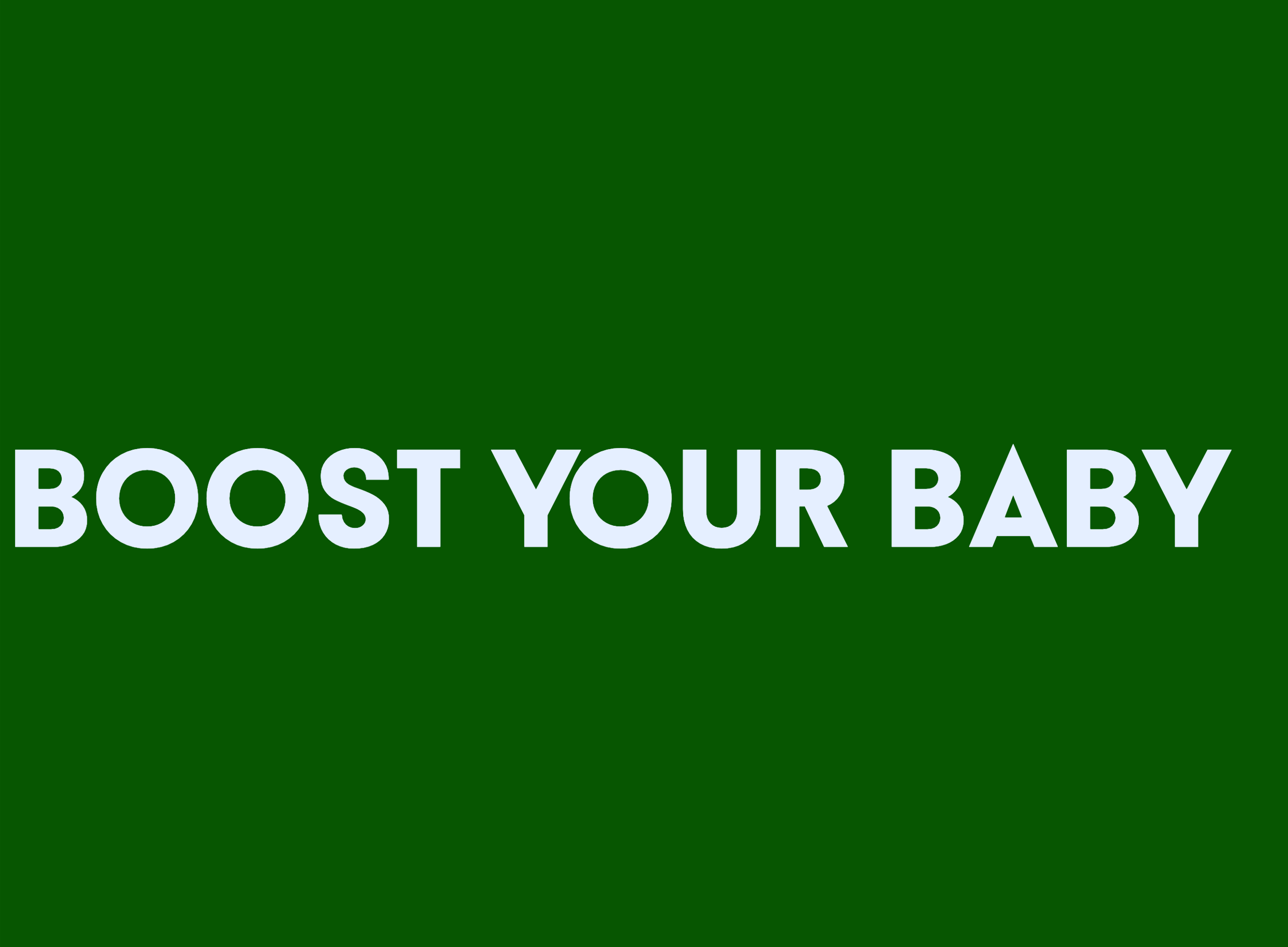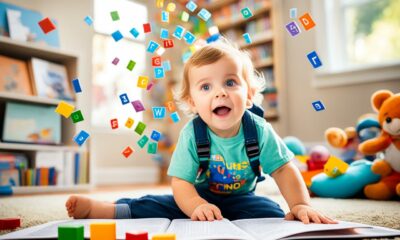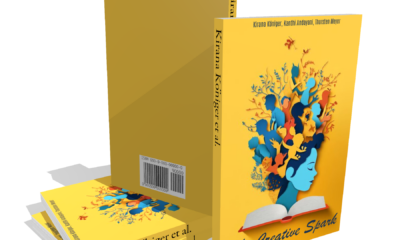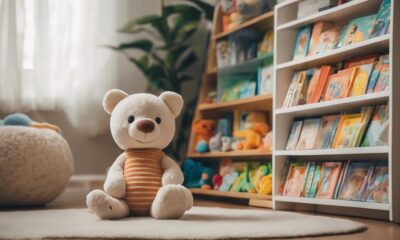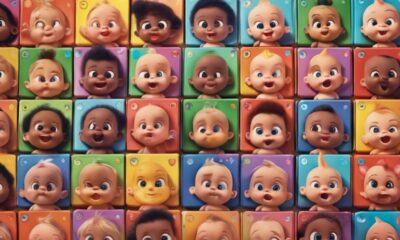Baby Development
17 Month Old Baby Reads: Early Literacy Breakthrough
Discover how a 17 month old baby reads, unlocking early literacy skills. Learn tips to nurture your toddler’s reading journey.
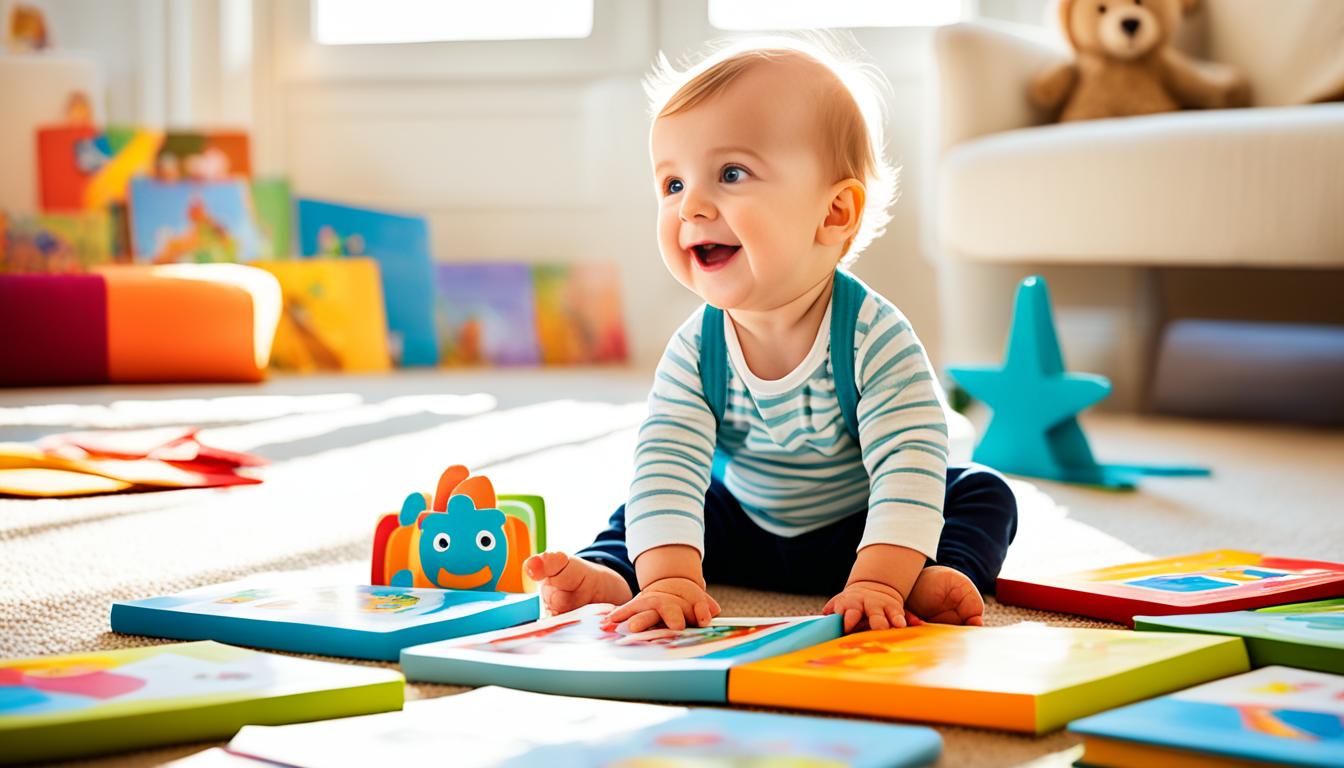
Did you know a 17-month-old baby can start to read? This amazing fact is backed by research. Toddlers can begin their reading journey very young. We’ll explore how toddlers develop reading skills and share tips to help their literacy.
Key Takeaways:
- A 17-month-old baby can show early literacy skills through reading.
- Research reveals that empathic abilities play a crucial role in the development of reading and language skills.
- Newborns have the capacity for basic forms of empathy and pay attention to emotional cues.
- Engaging in make-believe play enhances empathy and contributes to language and literacy abilities.
- By 18 months, many babies demonstrate an understanding of others’ desires.
The Empathy Connection: A Key to Early Literacy
Babies are amazingly in tune with feelings from a young age. They can feel what others feel. This talent helps with making friends and learning how to talk.
Studies show that caring about others’ feelings boosts reading and talking skills. When little ones understand stories’ emotions, they get more into reading.
We help babies read better by showing them empathy. Books full of different feelings teach them about the world. They start to love reading.
“Understanding others through books makes babies smarter and nicer. It connects them to the world.”2
Talking about story characters helps too. Ask what they think and feel. It makes them better at understanding others and reading.
Showing how to be kind and caring matters a lot. It’s key for reading well and being a good friend.
The Pyramid Model for Positive Behavior Support
The Pyramid Model helps little kids get better at managing feelings. It’s like building blocks for being nice and learning easily. It has four steps from simple love to helping those who struggle a lot.
“This model says actions have meanings. Teaching kids to be nice makes them feel good and read better.”2
Using the Pyramid Model, adults can teach kids about feelings in fun ways. Books, games, and talks about feelings are part of it. It helps kids understand themselves and others.
“Educators are key. They use books and talks to grow kids’ hearts and minds.”2
Caring for yourself helps you teach better. Happy teachers create happy classrooms. Kids learn to read and feel better too.
The picture shows how feeling for others helps kids learn to read. Dive into stories, and watch them grow.
Newborns and Empathy
Newborns show empathy from the start. They feel upset when they hear other babies cry. This shows they can share feelings3. Newborns look for happy sounds and loving faces. They like when people make eye contact with them3. This shows newborns like being around others.
Newborns start to understand how to communicate because they notice emotions. They learn to connect with people and understand feelings3. This helps them talk and make friends later in life. It also helps them understand others better.
When babies are 6-8 weeks old, they smile at people who take care of them. This shows they are beginning to express happiness3. By 8-10 months, they can share feelings without words3. They try to comfort others who are upset. This is how their empathy grows.
By 12 months, kids play games that help them see the world from another’s view3. Pretend play helps them understand other people’s feelings. This is important for developing kindness and empathy.
At 14-18 months, babies try to help by giving things to others3. By 18 months, they even bring things others might like, showing they care3. These actions show they are learning to pay attention to what others need.
By 30 months, children’s empathy is more obvious. They might offer a blanket to someone who’s cold or a toy to someone who’s sad3. Parent’s support is key to help children grow their empathy. This supports their happiness and success in getting along with others.
Empathy is crucial for connecting with others. Newborns are born with this ability, and it grows with care and love. Parents can help their babies develop empathy. This supports their growth in language and helps them make friends.
Development of Empathy in Newborns
| Developmental Stage | Empathy Milestones |
|---|---|
| Newborn | Reacting with distress when hearing other babies cry |
| 6-8 weeks | Flashing a social smile at caregivers |
| 8-10 months | Showing signs of empathic concern through facial expressions and gestures |
| 12 months | Engaging in pretend play to develop empathy and perspective-taking skills |
| 14-18 months | Displaying signs of empathy and helpfulness by spontaneously handing objects to others |
| 18 months | Bringing others things they have observed them enjoying, demonstrating empathic breakthrough |
| 30 months | Displaying more sophisticated empathic behaviors, such as bringing comfort objects to those in need |
Reference:3
Developing Social Skills and Empathy
Developing social skills and empathy is crucial during the early years of a child’s life. By 6-8 weeks, babies start showing social smiles and engaging in close communication. This is an early sign of their growing social skills and awareness of others.4
It is fascinating to witness how babies, at such a young age, can already demonstrate a desire to connect with others through their facial expressions and body language. These early social interactions lay the foundation for the development of empathy and healthy relationships later in life.
As babies grow, their social skills and empathy develop as well. By 8-10 months, they start showing concern for sad or distressed people. This shows their early grasp of emotions and the need to offer comfort.4
By 14-18 months, babies begin to show empathy and helpfulness towards others. This stage shows their growing understanding of others’ needs and their eagerness to help.4
These early social interactions and empathy play a key role in language and literacy skills development. Empathy helps children understand and connect with others’ feelings and experiences. This fosters their communication and relationship-building skills throughout life.4
Facial Expressions: A Window into Emotions
Facial expressions are key in social interactions and empathy building. Infants and toddlers focus on facial expressions to get clues about others’ feelings.4
Research tells us babies just a few months old can tell apart different facial expressions. This skill lets them start understanding and empathizing with the emotions shown.4
For parents and caregivers, being aware of our own facial expressions matters. Positive interactions can boost their social development and empathy.4
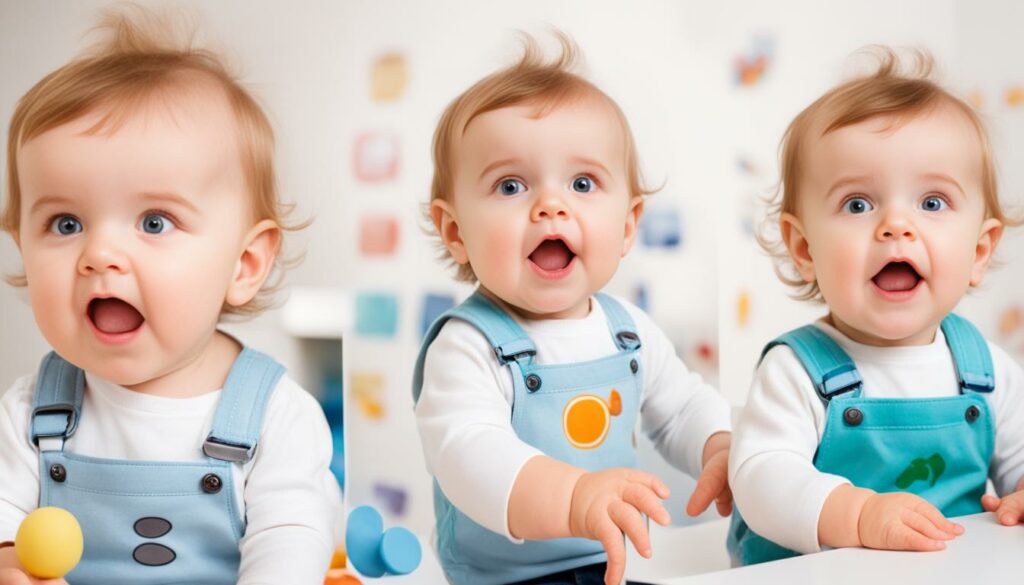
Play and Empathy: A Powerful Combination
Play is crucial for a child’s development, especially for growing empathy. It lets children explore roles, see different perspectives, and learn cooperation and communication.5
“Play is the work of childhood.” – Fred Rogers
In make-believe play, children learn about each other’s intentions and how to cooperate. This understanding boosts empathy, helping reading and language skills grow.5
By joining in make-believe play, we can help them grow socially and emotionally. This supports their empathy and language skills.5
Supporting Empathy and Social Skills
As parents and caregivers, there are several ways we can support and nurture our children’s empathy and social skills:
- Model empathy and kindness in our own actions and interactions.
- Encourage turn-taking games and sharing activities to teach children the importance of cooperation and respecting others’ needs.4
- Provide visual reminders, such as using picture schedules or visual cues, to help toddlers understand and follow routines.4
- Establish a safe and welcoming “home base” where children can check-in for reassurance and support.4
- Integrate a child’s cultural background into their daily routines, helping them develop a strong sense of identity and self-esteem.4
By implementing these strategies and engaging in meaningful interactions with our children, we can support their social and emotional development while fostering the growth of their language and literacy skills.4
Milestones in Social Skills and Empathy
| Age | Social Skills Milestones | Empathy Milestones |
|---|---|---|
| 6-8 weeks | – Displaying social smiles – Engaging in intimate communication |
– Developing awareness of others’ presence – Responding to emotional cues |
| 8-10 months | – Showing concern for sad or distressed individuals | – Demonstrating understanding of others’ emotions |
| 14-18 months | – Demonstrating empathy and helpfulness | – Recognizing and responding to others’ needs |
As children meet these milestones, they build a strong foundation in social skills and empathy. This greatly improves their language and literacy. By encouraging empathy and social interaction, we help our children approach the world with kindness and good communication skills.45
Make-Believe Play and Empathy
Make-believe play is super important for toddlers. It helps their imagination and creativity grow. But did you know it’s also key for learning to understand and care about others’ feelings? When kids play pretend games with others, they learn how to see things from different viewpoints. This helps them become more caring and understand others better6.
While playing pretend, kids might become doctors, teachers, or superheroes. They learn about different perspectives. For instance, by playing “house,” a kid might act as a parent and understand a parent’s duties and feelings. Experiencing these roles helps kids feel what others feel in real life6.
“When children engage in make-believe play, especially with older children and adults, they have the opportunity to step into different roles, tune into each other’s intentions, and cooperatively interact.”
Make-believe play isn’t just fun. It also boosts kids’ talking and reading skills. By pretending and talking through their roles, kids practice using new words and telling stories. This improves how they express themselves. It helps kids become better at reading and talking with others6.
Moreover, pretend play teaches problem-solving and creativity. Kids learn to work out social issues, decide on roles, and get along while playing. These skills are super important. They help kids make friends and understand others better6.
Examples of Make-Believe Play
Here are some fun pretend play ideas that help kids learn about others:
- Pretend tea party: Children practice being both host and guest, which teaches sharing.
- Pretend doctor’s office: Kids play doctors, nurses, and patients, learning to care for others.
- Pretend grocery store: Playing customers and cashiers helps kids see different sides of shopping.
These activities help kids walk in someone else’s shoes and grow their caring and understanding. You can help by giving them props, playing along, and asking questions. And don’t forget to praise their creativity6.
Key Milestones in Make-Believe Play
| Age | Developmental Milestones |
|---|---|
| 18 months | Toddlers start simple pretend games like feeding a doll or talking on a toy phone. |
| 2 years | Make-believe play gets more detailed. Kids pretend to be different characters and tell stories. |
| 3 years | Pretend play gets more complex and planned. Kids invent scenarios with rules and roles. |
| 4 years | Children’s make-believe play includes others’ ideas and becomes more cooperative. |
As kids get older, their pretend play grows in complexity, boosting their social skills and empathy. Supporting their pretend play helps them get ready for reading and communicating better6.
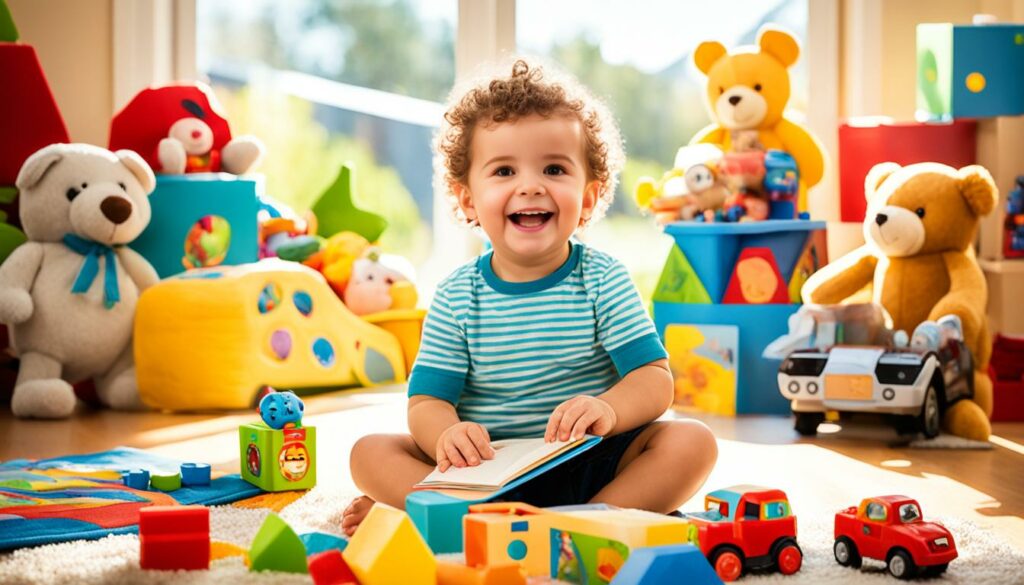
Understanding Others’ Desires
By 18 months, babies make an amazing step in empathy. They start to understand others’ desires with real acts of kindness. They might give someone something they’ve seen them enjoy before. This shows they get that not everyone wants the same things. It’s a big leap in their emotional growth7.
This leap isn’t just cool because it shows they care. It’s also key for their overall growth. It’s really important for learning how to talk and getting ready to read.
“Empathy is an essential component of early literacy. It allows children to connect with others on an emotional jury, understand different perspectives, and interpret characters’ feelings in stories.”
Research reveals that toddlers who are very empathetic often have better language skills. They’re good at both understanding and sharing their thoughts. This shows how feelings and language skills are linked7.
As toddlers get older, their empathy helps them understand more about the world. It helps them have better chats and learn more about reading and writing.
To wrap up, being able to understand others’ desires is very important for young kids. It helps with talking and getting ready to read. This tells us how vital it is to help kids be empathetic early on7. Doing this, parents and caregivers can help kids be ready for life, full of empathy, literacy, and social success.
Deeper Understanding and Helping Behavior
As kids get older, they get better at understanding how others feel. By 30 months, they start to help in thoughtful ways. They may bring a blanket to someone who is cold or comfort someone feeling lonely8.
Teaching kids empathy and kindness helps them get along with others. It also boosts their reading and speaking skills.
Empathy as a Lifelong Skill
Teaching kids to be empathetic is key for their social skills and learning growth. Parents help by talking about feelings and showing constructive emotion handling. This way, they guide their children to understand others better.
Kids as young as 6 months use social cues from those they love to assess reactions. This early empathy is crucial for their future social skills.9
From 18 to 24 months, toddlers learn that others have their own thoughts and feelings. Seeing themselves in mirrors, they start understanding self-awareness too.9
Empathetic parenting, like discussing emotions, plays a big role in teaching empathy. Storytime is also helpful, as kids learn to feel what characters do.9
Acting kind and caring teaches kids empathy when they see it in their parents. Kids mimic this and become more empathetic themselves.9
Playing pretend games is another way to boost empathy. It lets kids see different viewpoints and understand others’ feelings better.9
Learning empathy is an ongoing process. It takes time and grows with your child. Expect ups and downs as they learn to care for others.9
Teaching empathy early leads to better social skills later, even if full empathy takes time to develop. Helping kids interact and showing them how to care about feelings supports their empathy growth.10
Parents shouldn’t rush kids to say sorry before they get why. Showing them the impact of their actions teaches deeper empathy.10
In short, empathy shapes a child’s ability to get along with others and succeed in life. By encouraging empathy, parents set their kids up for success and fulfillment.
Tips to Nurture Your Toddler’s Reading Journey
To help your toddler love reading, try some key strategies at home. These tips will boost their book, language, and literacy love.
Engage in One-on-One Conversations
Talking directly with your toddler is powerful. It makes your bond stronger and develops their language. Get them to talk about their thoughts and listen well. 11
Ask open questions to keep the chat going. This boosts their words, understanding, and lets them share ideas. 11
Mimic Facial Expressions and Emotions
Copying your toddler’s facial expressions builds emotional links. It makes a supportive space for learning language. Seeing their feelings mirrored makes them feel seen and heard. 11
This practice boosts emotional smarts and empathy. Those are key for getting stories and character feelings in books. 11
Show Genuine Interest in Their Attention
During reading times, really show you’re into it. Face them, keep eye contact, and dive into the story together. Your excitement and focus encourage them to pay attention. 11
This makes reading fun and important to them. It also improves their reading skills and love for books. 11
Engage in Make-Believe Play and Pretend Reading
Play and pretend reading are great for learning. Let your child role-play and explore stories with toys or books. These activities grow their storytelling and reading abilities. 11
Imaginary play boosts their love for stories, too. It shapes their reading journey in a positive way. 11
Model Helpfulness and Empathy
You are your child’s biggest influence. Showing kindness and empathy teaches them valuable lessons for reading. Share books and show empathy daily. Your actions are lessons for them. 11
This behavior builds their social skills and emotional smarts. It helps them understand story characters better, too. 11

Toddler reading journey support is ongoing and rewarding. Use these tips to boost their language, empathy, and book love. Conversation, engagement, and your example guide their literacy growth. 11
Conclusion
In conclusion, getting babies into reading early is key for their future skills. Parents can help by using play and social activities to build up their toddler’s ability to read. Getting how empathy and reading connect helps parents be a part of their child’s learning adventure. This also sparks a joy for books and knowledge.
Studies tell us the early years are vital for brain and language growth12. By doing things like pretend play, parents can better their kid’s understanding and speaking abilities12. Also, playing with others and being kind boosts their emotional smarts and empathy12.
Noticing and helping with their kid’s first steps in reading is crucial for parents13. Reading together every day and showing them how you read can make their speaking and word knowledge even better13. As kids get older, they’ll get better at thinking critically and understanding what they read12.
Parents have a big role in their kids’ journey to becoming readers. By loving books and teaching early reading, they’re setting their kids up for doing well in school and life. This builds a lasting love for learning and reading13.
FAQ
Can a 17-month-old baby read?
How can I nurture my baby’s reading journey?
What role does empathy play in early literacy?
How does empathy develop in newborns?
How do social skills contribute to empathy development?
How does make-believe play enhance empathy?
When do babies start understanding others’ desires?
How does deeper understanding and helping behavior relate to empathy?
Is empathy a lifelong skill?
What are some tips to nurture my toddler’s reading journey?
Source Links
- https://www.slideshare.net/slideshow/literacy-development-in-infants-and-toddlers/6977102
- https://eclkc.ohs.acf.hhs.gov/teaching-practices/teacher-time-series/emotional-literacy-infants-toddlers
- http://www.urbanchildinstitute.org/articles/features/empathy-and-kindness-early-developmental-milestones
- https://www.zerotothree.org/resource/12-24-months-social-emotional-development/
- https://www.zerotothree.org/resource/from-baby-to-big-kid-month-17/
- https://raisingchildren.net.au/toddlers/development/development-tracker-1-3-years/18-24-months
- https://www.thebump.com/toddler-month-by-month/17-month-old
- https://www.pampers.com/en-us/toddler/development/article/17-month-old
- https://www.zerotothree.org/resource/how-to-help-your-child-develop-empathy/
- https://www.whattoexpect.com/toddler/behavior-and-discipline/how-to-teach-empathy-to-toddlers
- https://homeschool.rebeccareid.com/normal-stages-of-reading-with-a-baby/
- https://en.wikipedia.org/wiki/Child_development
- https://www.yourmodernfamily.com/done-having-babies/
Physical Development
Baby Fitness: Fun Ways to Keep Baby Active
Want to keep your baby active and engaged? Discover fun ways to promote physical development and bonding through creative fitness activities.
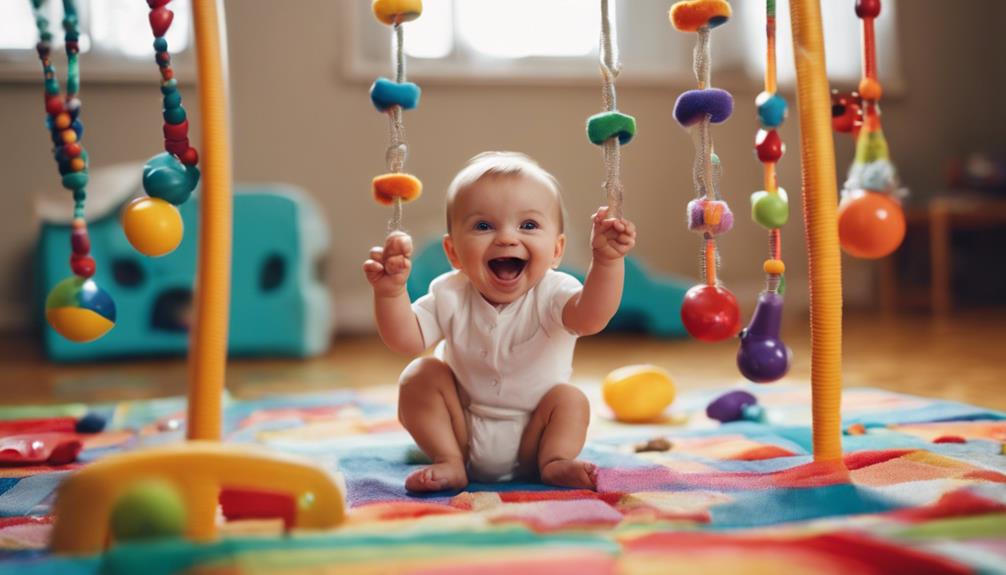
Keep your baby active with engaging activities like tummy time for muscle strength and interactive workouts. Support baby during sit-ups and incorporate face-to-face engagement for bonding. Lift exercises can strengthen muscles – always prioritize safety. Stroller fitness adventures and crawling challenges add fun to physical activity. Dance and music activities promote coordination and a joyful atmosphere. Sensory play offers developmental advantages and quality bonding time. These activities cater to your baby's growth and enjoyment, promoting physical development and strengthening your bond. Different activities target various muscle groups and enhance motor skills, creating lasting memories and a healthy lifestyle foundation.
Key Takeaways
- Incorporate interactive workouts to engage baby in physical activity and bonding.
- Explore stroller fitness adventures for active and enjoyable outings.
- Encourage crawling challenges to boost movement and cognitive skills.
- Dance and music activities enhance motor skills and parent-child bonding.
- Create sensory playtime for developmental benefits and quality bonding.
Stretching Together
To enhance your baby's flexibility and build a stronger bond, start every workout session with stretching together. During this time, you can introduce your little one to the concept of 'Tummy Time,' which not only helps in strengthening their neck, back, and shoulder muscles but also aids in the development of motor skills. As you gently hold their head and guide them through the stretches, remember to keep an eye on their comfort and adjust the intensity accordingly.
Engaging with your baby during stretches is key. Make sure to maintain eye contact and interact with them by counting out loud or making silly faces. Encouraging your baby to mimic your movements not only makes stretching interactive but also fosters a sense of fun and bonding between the two of you.
Meet in the Middle

Start engaging your baby in a fun and interactive workout by incorporating them into sit-ups to meet in the middle. This activity isn't only enjoyable but also beneficial for the development of young children.
Here's how you can make the most of this exercise every day:
- Provide Support: Guarantee your baby's safety by offering support while including them in the sit-ups. Make eye contact and maintain a secure grip to prevent any accidents.
- Keep Them Entertained: Make the workout engaging by making silly faces, interacting with your baby, and incorporating playful gestures. This will help keep your little one entertained and excited to participate.
- Encourage Movement: As you perform sit-ups, involve your baby by placing them on your legs or midsection. Encourage them to stretch and move along with you, promoting physical activity that contributes to their development.
Baby Lift Fun

Engage your baby in a fun and effective workout by incorporating baby lifts into your routine. When performing baby lifts, make sure to prioritize safety by lifting your baby gently and securely to prevent any strain or discomfort.
These lifts can help strengthen your arms, shoulders, and core muscles while allowing you to interact with your little one. To target different muscle groups in your core, consider adding a twist from side to side as you lift your baby.
It's essential to ensure that your baby can support their head independently before attempting baby lifts to avoid any risks. By including baby lifts in your workout regimen, you can make exercise enjoyable and engaging for both you and your baby.
Remember to always pay attention to your baby's cues and comfort levels during these activities to create a positive and beneficial experience for both of you.
Face-to-Face Tummy Time

Incorporate Face-to-Face Tummy Time into your baby fitness routine to engage with your little one and strengthen your core muscles simultaneously. This activity involves positioning yourself facing your baby during their tummy time session, allowing you to interact and bond while working on your fitness.
Here are three benefits of incorporating Face-to-Face Tummy Time into your routine:
- Bonding and Interaction: By maintaining eye contact with your baby at their eye level, you can create a strong bond and encourage social interaction during the exercise.
- Core Strengthening: While engaging with your baby, you can perform push-ups, which help strengthen your core muscles. This dual benefit allows you to work on your fitness while spending quality time with your little one.
- Promote Physical Development: Face-to-Face Tummy Time not only benefits your core muscles but also aids in promoting your baby's physical development. This interactive exercise can enhance their motor skills and overall growth.
Tummy Time Hold

Lie on your back with raised legs to provide a supportive surface for your baby during Tummy Time Hold. This position offers a beneficial way to help your little one develop essential muscles.
By placing your baby on your legs, they engage in strengthening exercises for their neck, back, and core. Not only does Tummy Time Hold contribute to physical growth, but it also enhances bonding moments between you and your baby.
As your baby practices light crunches in this position, they work on improving their motor skills and balance. This interactive and engaging activity can be a fun way to spend quality time together while promoting your baby's overall well-being.
Consider incorporating Tummy Time Hold into your routine to support your baby's physical development and create memorable moments filled with laughter and connection.
City Stroller Adventures

To keep both you and your baby active and engaged, consider undertaking exciting City Stroller Adventures that offer a fun way to explore urban environments together.
- Incorporate Fitness: During your city stroller adventures, try incorporating lunges, jumps, or varying your pace to add a physical workout element to your stroller outings. This can help you stay active while pushing the stroller and engaging different muscle groups.
- Choose the Right Location: Opt for a quiet and safe location for your city stroller adventures. This guarantees a pleasant and stress-free experience for both you and your baby. Selecting a place with smooth paths and beautiful surroundings can make the outing more enjoyable.
- Enhance Sensory Experience: Enjoy the outdoor surroundings during your stroller walks to enhance the sensory experience for your baby. The sights, sounds, and smells of the city can captivate your little one's curiosity and create lasting memories for both of you.
Crawl Race Challenge
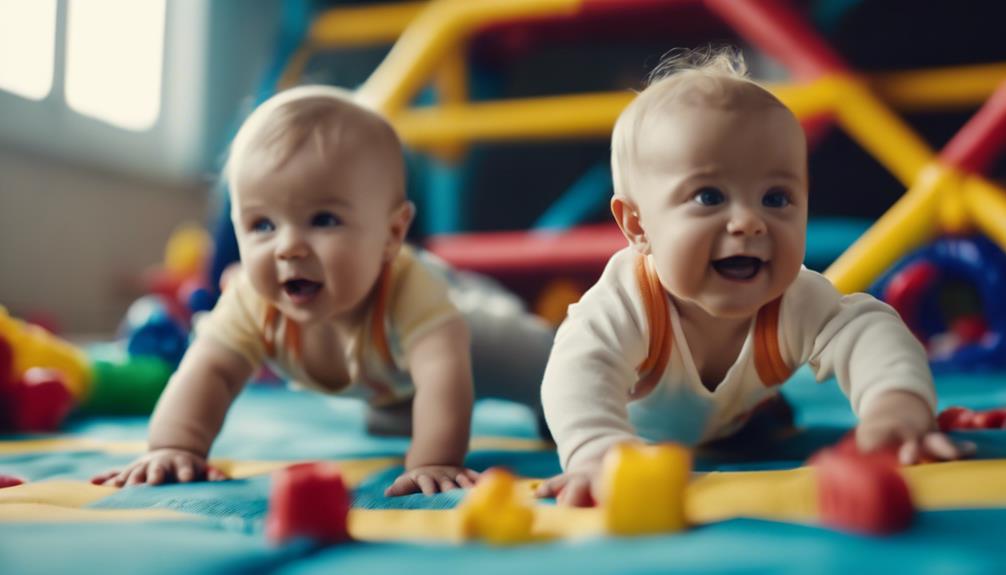
Engage your baby in a crawl race challenge to boost their crawling skills and encourage movement in a playful manner.
By racing alongside your little one on all fours, you provide a stimulating environment that promotes mobility and physical activity.
This interactive activity not only supports your baby's development but also creates a fun and bonding experience for both of you.
Crawling for Mobility
Encourage your baby's mobility and motor skills development through the engaging and fun activity of a crawl race challenge. Crawling is an important milestone in your infant's growth, enhancing their strength, coordination, and cognitive abilities.
Here are three key benefits of engaging in crawl races with your little one:
- Physical Strength: Crawling aids in building core strength, improving balance, and enhancing spatial awareness. Through the crawl race challenge, your baby can strengthen their muscles and develop better control over their movements.
- Motor Skills Development: Participating in crawl races encourages your baby to explore movement patterns, leading to the refinement of their gross motor skills. This activity can help them gain confidence in their physical abilities and coordination.
- Parent-Child Bonding: Engaging in interactive activities like the crawl race challenge fosters a stronger bond between you and your baby. It provides a fun and stimulating environment for them to practice crawling while enjoying your supportive presence.
Encouraging Movement Playfully
Get ready to amp up your baby's movement skills with the exciting activity of the Crawl Race Challenge. This fun and engaging activity involves getting down on all fours and racing with your baby as they crawl, which not only promotes their physical development but also encourages their crawling skills through playful interaction.
By participating in the Crawl Race Challenge, you can support your baby's exploration and movement in a safe and enjoyable manner, fostering a deeper bond between you and your little one. This simple yet entertaining race offers a great way to promote physical activity while creating lasting memories with your baby.
Additionally, engaging in the Crawl Race Challenge can enhance your baby's motor skills and coordination, providing a fun and memorable experience for both of you. So, get ready to crawl alongside your baby and enjoy the benefits of this playful and movement-boosting activity.
Baby Dance Party
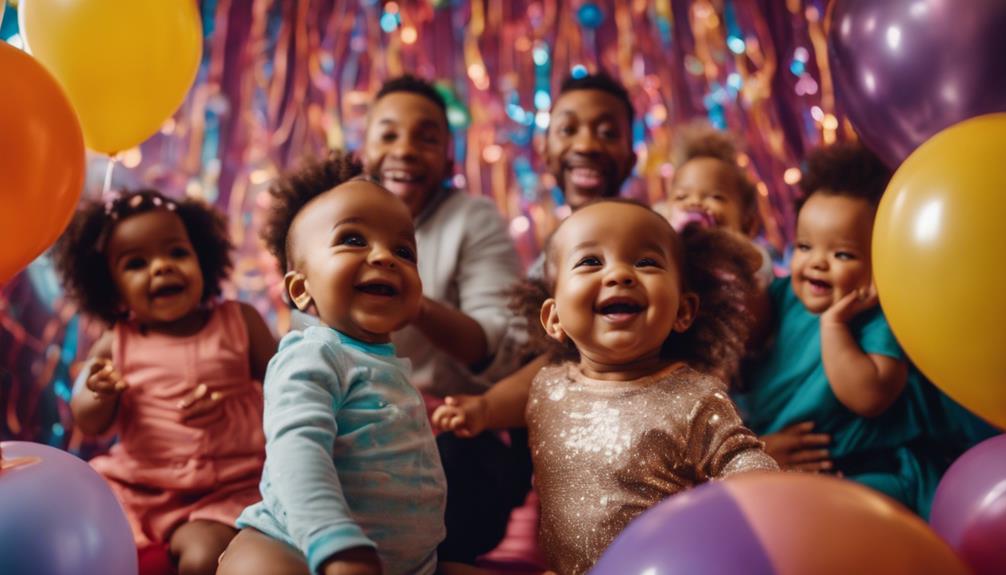
Baby dance parties offer a dynamic way to combine music and movement, engaging both you and your baby in fun and interactive play. Through these lively sessions, you can foster a deeper bond with your little one while enhancing their coordination and rhythm skills.
Such engaging activities not only promote physical fitness but also create a joyful atmosphere that can strengthen your relationship through shared moments of play and movement.
Music and Movement
Engage your little one in lively dance sessions to boost their coordination and motor skills while fostering a strong parent-child connection through music and movement. Dancing to music not only enhances physical abilities but also helps in creating lasting memories with your baby.
Here are three tips to make your baby dance party a fun and beneficial experience:
- Choose a Variety of Music: Introduce your baby to different genres and rhythms to stimulate their auditory senses and expand their musical appreciation. From classical tunes to upbeat pop songs, exploring various types of music can keep your baby engaged and excited during dance sessions.
- Follow Your Baby's Lead: Allow your baby to move freely and express themselves through dance. Following their cues and mirroring their movements can make the experience more interactive and enjoyable for both of you, strengthening your bond and promoting emotional connection.
- Incorporate Props: Adding props like colorful scarves or musical instruments can add a sensory element to the dance party, encouraging exploration and creativity while enhancing cognitive development in your little one.
Engaging Playtime Activities
Explore the world of engaging playtime activities with your little one through the joyful and beneficial experience of a baby dance party.
These lively gatherings not only bring fun and entertainment but also offer numerous developmental advantages for your baby.
Baby dance parties are an interactive way to engage with your little one, fostering movement and physical activity in a vibrant setting. By dancing with your baby, you can help enhance their coordination, balance, and rhythm skills.
The music played during these dance parties serves as a sensory stimulant, aiding in the development of your baby's senses and contributing to a positive mood and emotional well-being.
Additionally, engaging in baby dance parties creates an ideal opportunity for bonding and quality time with your child. By encouraging movement through dance early on, you're laying a foundation for a healthy and active lifestyle that can benefit your baby in the long run.
Bonding Through Dance
Enhance your bond with your little one through the joyful experience of a baby dance party. Dancing with your baby not only creates moments of happiness but also offers a range of developmental benefits. Here are three ways how baby dance parties can strengthen your connection and promote your baby's growth:
- Multisensory Engagement:
The combination of music, movement, and eye contact during a dance party stimulates your baby's senses, fostering a deeper level of engagement between you and your little one.
- Physical Development:
Dancing with your baby encourages physical activity, aiding in the development of coordination, balance, and rhythm. These movements help strengthen your baby's muscles and improve their overall motor skills.
- Cognitive Stimulation:
Engaging in dance activities can boost your baby's cognitive skills by introducing them to new patterns, rhythms, and movements. This stimulation can enhance your baby's learning abilities and contribute to their cognitive development.
Frequently Asked Questions
How to Encourage a Baby to Be More Active?
To encourage a baby to be more active, place them on their back for leg kicking exercises, engage in pulling and pushing activities, allow supervised crawling, promote outdoor play for spatial awareness, and introduce swimming early on for muscle development and water confidence.
How Do I Entertain My Baby While Working Out?
While working out, entertain your baby by turning exercises into games! Use counting and eye contact during stretches, involve them in sit-ups for interaction, twist side to side during baby lifts, and have a dance party for fun movement.
How Do You Entertain an Active Baby?
To entertain an active baby, engage in interactive play with toys and music. Encourage movement through tummy time, crawling, and reaching for objects. Take stroller walks in safe areas, create dance parties, and enjoy outdoor activities.
What to Do With Baby When You Go to the Gym?
When you go to the gym, you can utilize their childcare services. They have trained staff to keep your baby safe and entertained while you work out. Check the facilities and communicate your baby's needs for a worry-free experience.
Conclusion
To sum up, integrating baby fitness activities into your daily routine can't only enhance physical health but also foster lasting bonds with your little one.
So why not make fitness a fun and interactive part of your baby's day? Give these engaging exercises a try and observe how your baby becomes stronger and more active with each session.
Remember, staying active is crucial for a healthy lifestyle, even for the smallest members of your family.
Physical Development
Baby Enrichment Toys: Enhancing Development
Boost your baby's development with sensory toys and interactive games, setting the stage for cognitive growth and motor skills – discover more benefits ahead.

Enhance your baby's developmental journey with sensory toys for neural growth. Stimulating cognitive skills with interactive toys nurtures critical thinking and logical abilities. Fine motor skills improve through toys like Wooden Blocks, aiding coordination and dexterity. Problem-solving toys, like shape sorters, lay the groundwork for kids' logical reasoning. Toys with sounds and words foster language acquisition and social-emotional skills. Choosing the right enrichment toys strategically benefits cognitive, motor, and social development. Further insights on selecting the best toys for your baby await.
Key Takeaways
- Sensory toys aid in neural development through varied stimuli.
- Interactive toys enhance cognitive skills like problem-solving and logical thinking.
- Fine motor skills are developed through activities like stacking blocks.
- Problem-solving toys boost critical thinking and decision-making abilities.
- Interactive toys foster language and social-emotional development in infants.
Importance of Sensory Stimulation
Engaging your baby in sensory stimulation through enrichment toys is essential for their neural development and overall growth. Sensory toys play an important role in providing infants with the necessary stimuli to enhance their cognitive and motor skills. By exposing babies to various textures, sounds, and colors, these toys engage multiple senses, contributing to their overall development.
Through sensory play, infants not only entertain themselves but also actively explore the world around them, fostering curiosity and facilitating learning experiences.
The importance of sensory stimulation from an early age can't be overstated. It helps in building neural connections in the brain, laying the foundation for better problem-solving and social interaction skills in the future. By introducing infants to a diverse range of sensory experiences through toys, you're actively supporting their cognitive and motor skill development, setting them on a path towards healthy growth and learning.
Enhancing Cognitive Skills
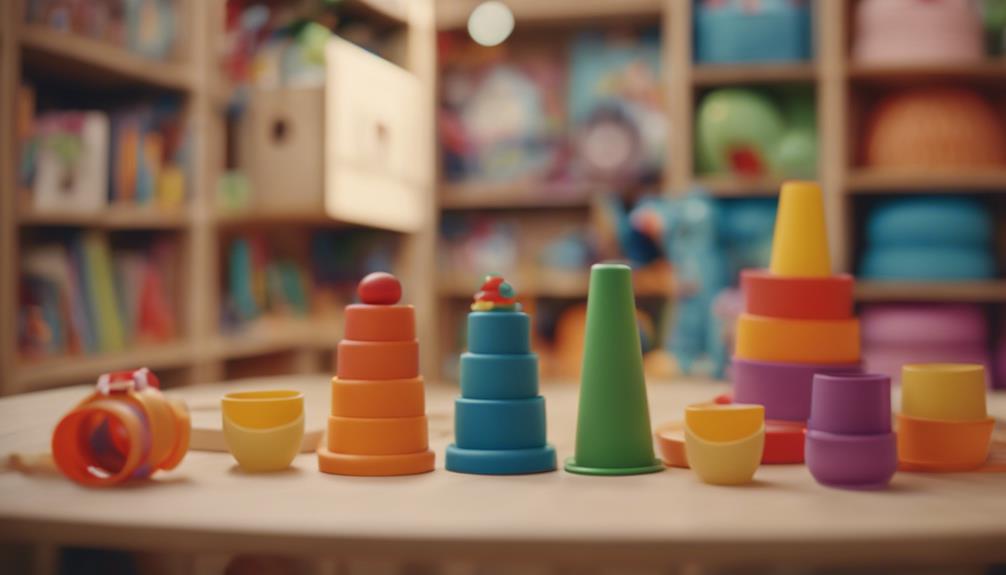
To boost your baby's cognitive skills, interactive toys that encourage problem-solving and logical thinking are essential. Cognitive development in infants is important for laying the foundation for future learning and understanding.
Toys like shape sorters, puzzles, and nesting toys are excellent choices to stimulate your child's cognitive development. These toys promote critical thinking, spatial awareness, and cause-and-effect relationships.
Engaging in activities that encourage exploration, discovery, and hands-on problem-solving can greatly enhance your baby's cognitive skills. Additionally, reading interactive books, playing with musical instruments, and participating in sensory play can further support cognitive growth in infants.
Fine Motor Skill Development
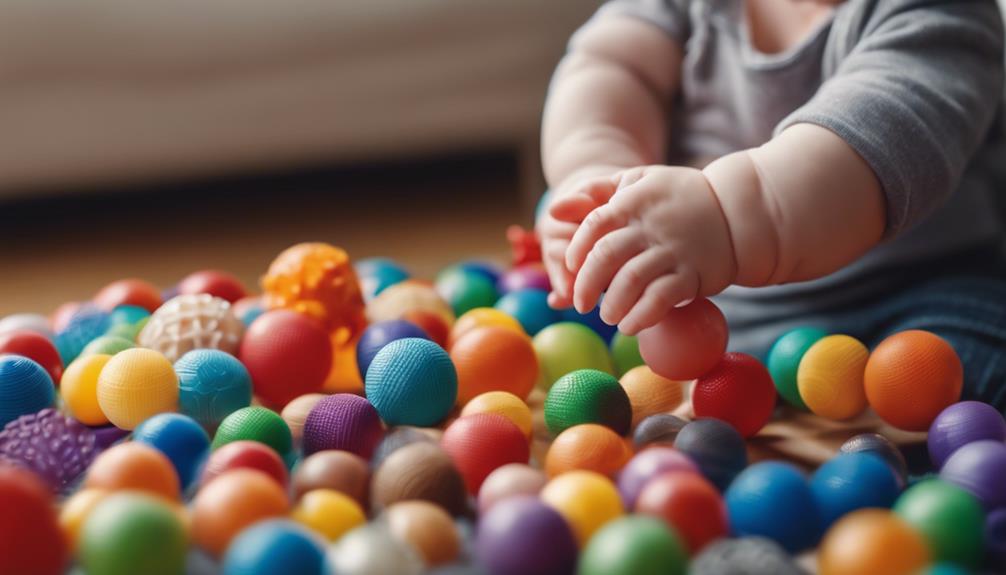
Fine motor skills involve the coordination of small muscles in movements like grasping, holding, and manipulating objects, essential for infants' overall development.
Toys like Wooden Blocks are excellent for enhancing fine motor skills in babies. Activities such as stacking blocks not only entertain infants but also aid in the development of hand-eye coordination and dexterity.
These developmental toys for babies are vital for laying the foundation for tasks like self-feeding, drawing, and writing later on. By engaging in activities that involve picking up, holding, and transferring objects, infants strengthen their fine motor skills, which are essential for more complex movements and tasks as they grow.
While gross motor skills involve larger muscle groups and whole-body movements, fine motor skills are necessary for precise actions. Encouraging your baby to play with stacking blocks and other toys that promote fine motor skill development is a fun and effective way to support their overall Baby Development.
Promoting Problem-Solving Abilities
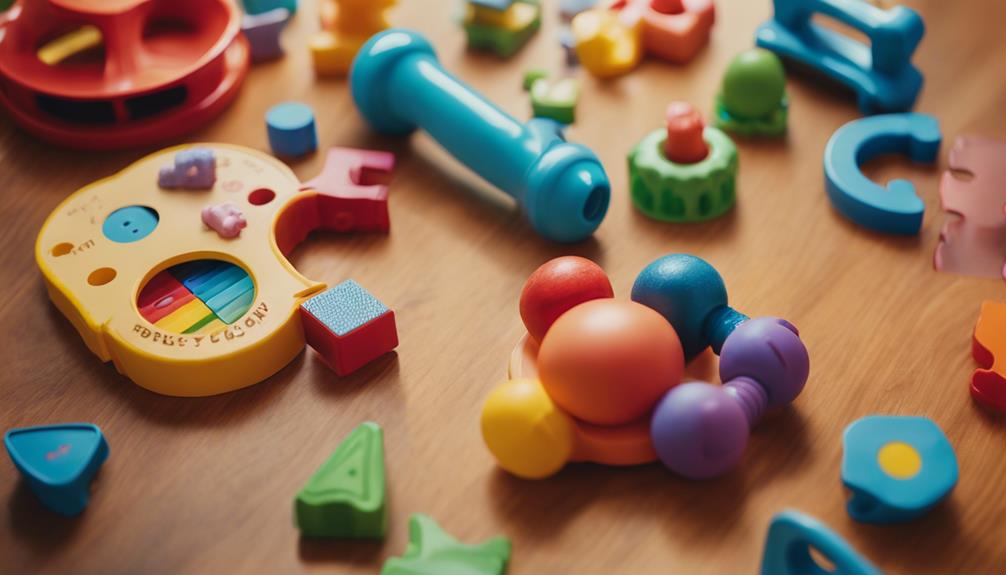
Encouraging your baby to interact with problem-solving toys like shape sorters and puzzles can foster their critical thinking skills from an early age. These toys provide opportunities for your little one to analyze, strategize, and find solutions to challenges, ultimately promoting cognitive development.
By engaging with problem-solving toys, babies learn to focus, concentrate, and persist in solving problems, which are essential skills for their overall development. The process of trial and error while playing with these toys enhances their problem-solving abilities and decision-making skills.
Shape sorters and puzzles not only lay the foundation for logical reasoning but also help in developing spatial awareness and fostering creative thinking in infants. Incorporating these toys into your baby's playtime can greatly contribute to their cognitive growth and prepare them with valuable skills that will benefit them throughout their lives.
Language and Social-Emotional Development
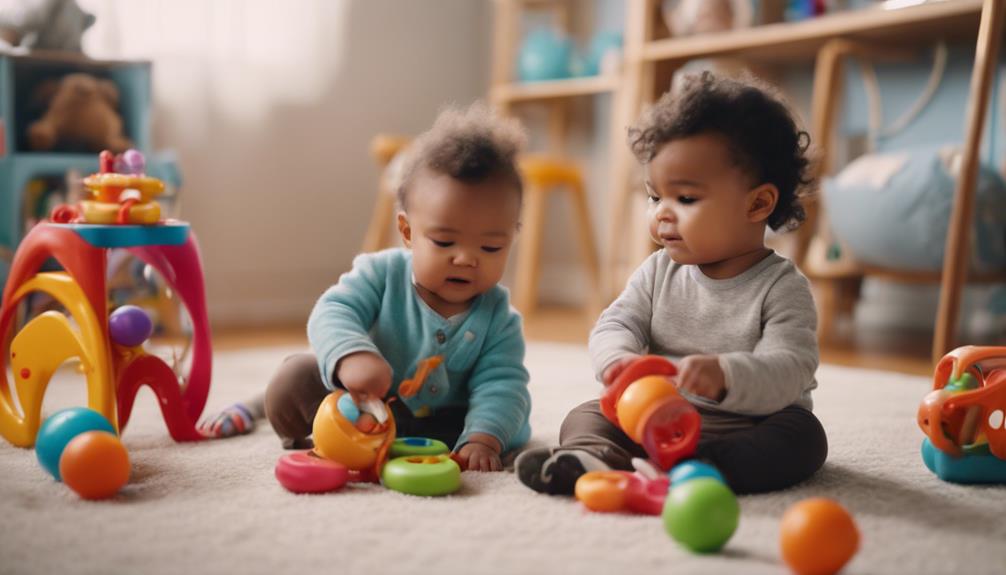
Interactive toys that incorporate sounds, music, and words play an important role in fostering language development in infants. These toys not only entertain but also help in expanding vocabulary and language skills.
Here are some key points to keep in mind:
- Interactive books: These books engage babies with colorful images, sounds, and simple words, aiding in language acquisition and cognitive development.
- Talking toys: Toys that speak words or phrases can assist infants in learning new words and understanding language patterns, promoting communication skills.
- Dolls: Playing with dolls can contribute to social-emotional development by encouraging empathy and nurturing behavior in children.
Toys that encourage language development and social-emotional skills are vital for a child's overall growth. By providing a variety of toys that stimulate language learning and foster empathy, you can support your baby's developmental journey effectively.
Choosing the Right Enrichment Toys
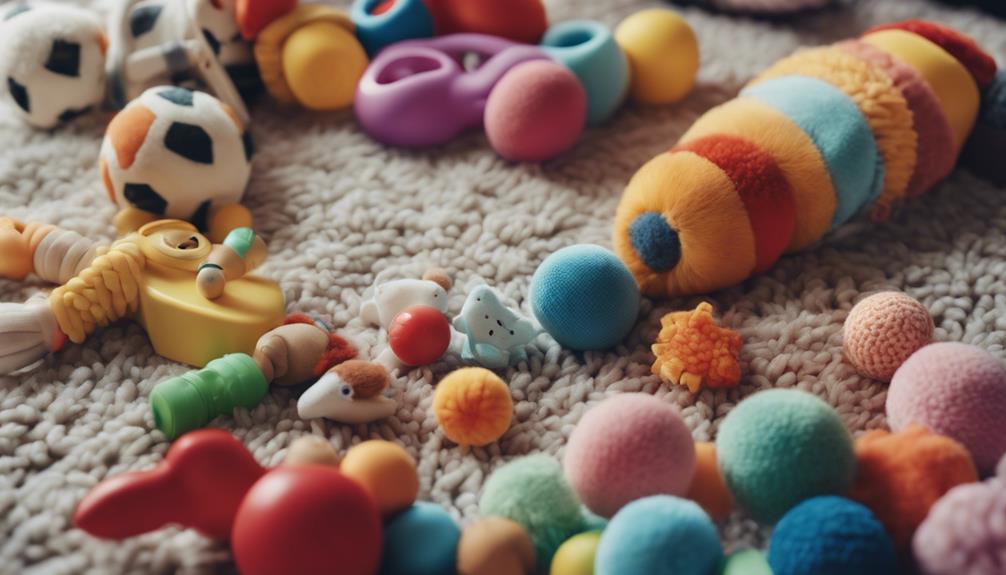
Consider the age and developmental stage of the child when selecting enrichment toys that cater to various aspects of growth and learning.
When choosing baby toys, opt for ones that aid in fine motor skills development through activities like grasping, stacking, and sorting.
Look for toys that promote cognitive development by encouraging problem-solving, memory, and logical thinking.
Sensory exploration can be enhanced with toys that have various textures, sounds, and colors to engage multiple senses.
Interactive play is important for social-emotional growth, so selecting toys that allow for shared experiences and cooperation is beneficial.
Make sure that the toys are age-appropriate to prevent any safety hazards and to match the child's current abilities.
Frequently Asked Questions
What Toys Are Good for Baby Development?
For your baby's development, consider toys like rattles, mirrors, and musical mobiles. These help with sensory and social growth. As they grow, textured teethers, soft squeeze toys, and peek-a-boo toys can aid cognitive and motor skills.
How Do Toys Stimulate Infant Development?
Toys stimulate infant development by promoting sensory exploration, cognitive skills, and motor coordination. They help babies learn cause-and-effect relationships, encourage problem-solving abilities, and enhance fine motor skills. Interactive toys with various textures, sounds, and colors contribute to cognitive growth.
What Type of Toys Are Best for Developing Cognitive Development?
To develop cognitive skills in infants, opt for toys like shape sorters and interactive books with textures. These items boost problem-solving abilities and stimulate learning. Musical instruments and cause-and-effect toys also aid in cognitive growth.
What Kind of Toys or Experiences Would Help Stimulate the Baby's Brain Development?
To boost brain development in babies, engage them with toys that promote sensory exploration, like rattles and soft toys. Interactive toys such as shape sorters and building blocks enhance fine motor skills. Encourage cognitive growth with textured books.
Conclusion
To sum up, baby enrichment toys play a vital role in enhancing a child's overall development. Research has shown that children who engage with sensory-stimulating toys from an early age are more likely to exhibit advanced cognitive, motor, problem-solving, and language skills.
In fact, a study conducted by the American Academy of Pediatrics found that infants who are exposed to a variety of enrichment toys show a 25% increase in language development by the age of 2. Choose wisely and watch your child thrive.
Physical Development
Baby Exercise: Keeping Your Baby Active
Kickstart your baby's active lifestyle with tailored exercises to enhance their physical development and milestones – find out how in this insightful guide!

Promote your baby's active lifestyle through tailored exercises is crucial for their physical development. These activities not only enhance muscle tone, coordination, and balance but also aid in achieving significant milestones like crawling and walking. Engaging in interactive play, prioritizing tummy time, and incorporating fun workout ideas can foster a holistic approach to your baby's well-being and growth. By implementing strengthening exercises and bonding through physical activities, you can support their motor development and nurture a stronger parent-child connection. Embrace the benefits of baby exercise to guarantee a healthy and active lifestyle for your little one.
Key Takeaways
- Engage in interactive play to stimulate physical development and strengthen muscles.
- Prioritize tummy time to prevent flat spots and enhance motor skills.
- Use baby carriers for exercises like baby lifts to build upper body strength.
- Incorporate dance parties and crawl races for fun workouts.
- Bond with your baby through exercise to promote emotional connection and well-being.
Benefits of Baby Exercise
Engaging in baby exercise offers numerous benefits that contribute to your child's overall development and well-being. One key advantage is the enhancement of upper body strength in infants. Activities like tummy time, where babies spend time lying on their stomachs, help them strengthen their neck, shoulder, and arm muscles. By regularly engaging in exercises that promote upper body strength, your baby can develop the necessary muscles to support milestones like lifting their head, rolling over, and eventually crawling.
Moreover, tummy time not only aids in building upper body strength but also plays an important role in preventing flat spots on the back of your baby's head. This essential exercise helps distribute your baby's weight more evenly when they're lying down, reducing the likelihood of developing positional plagiocephaly.
Incorporating tummy time and exercises that boost upper body strength into your baby's routine can greatly contribute to their physical development and overall well-being.
Importance of Movement for Babies
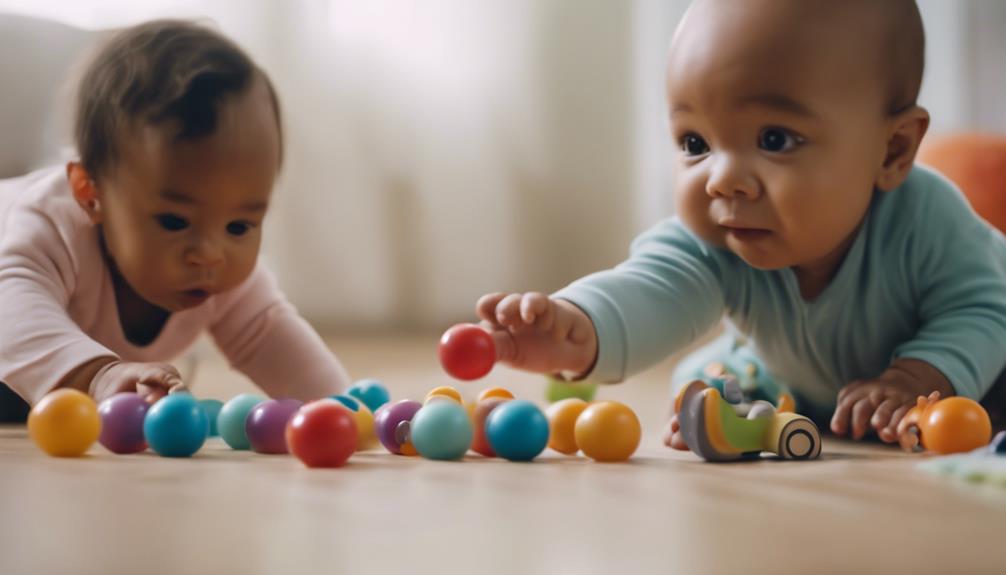
Regular movement is essential for babies as it strengthens muscles, improves motor skills, and supports overall physical development. When your baby gets used to moving their body, they not only enhance muscle tone but also develop coordination and balance.
Activities like tummy time help build neck and core muscles, important for later milestones such as sitting and crawling. Encouraging reaching motions can boost hand-eye coordination and fine motor skills. Crawling, whether traditional or commando style, aids in strengthening various muscle groups, preparing your baby for future movements like walking.
Engaging in gentle exercises with your baby not only promotes physical development but also fosters a strong bond between you both. These movements set the foundation for more complex physical skills later in life and contribute to your baby's overall health and well-being.
Top Baby Exercise Tips
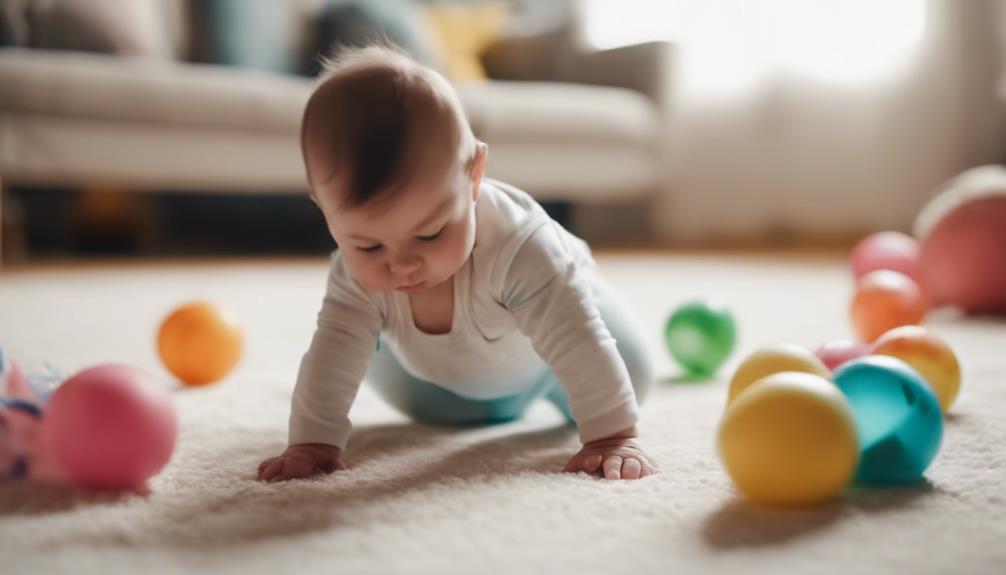
To promote your baby's physical development and strengthen your bond, consider these top tips for baby exercises.
- Engage in Interactive Play:
Incorporate interactive play into your daily routine to encourage movement and enhance your baby's motor skills development. Play games that involve reaching, grasping, and kicking to stimulate your baby's physical activity.
- Prioritize Tummy Time:
Introduce tummy time early on to help strengthen your baby's neck, head, and upper body muscles. This position is important for building essential muscles and preventing flat spots on your baby's head.
- Support Their Head:
When engaging in activities that involve movement, always make sure to provide proper support for your baby's head. Holding their head gently but securely during exercises like baby lifts and tummy time is necessary for their safety and comfort.
Fun Workout Ideas for Baby

Incorporate fun workout ideas to keep your baby active and engaged while promoting their physical development. Utilize a baby carrier for activities such as baby lifts, which not only provide exercise for you but also foster closeness with your little one.
Maintain eye contact during face-to-face tummy time holds to enhance bonding while encouraging your baby's core strength. Engage in a crawl race with your baby to stimulate their crawling skills through playful movement.
Create a lively atmosphere by having a dance party with your baby, incorporating music and active play to promote movement and enjoyment. Take advantage of outdoor walks or runs with your baby in a stroller to stay active together and explore the surroundings.
Make workout sessions interactive by involving your baby in exercises like stretching, sit-ups, and overhead presses to make physical activity a fun and beneficial experience for both of you.
Strengthening Exercises for Baby

Enhancing your baby's muscle tone and coordination through strengthening exercises is crucial for their physical development and motor skill enhancement. To guarantee your baby receives the maximum benefit from these exercises, follow these tips:
- Tummy Time: Place your baby on their tummy on a flat surface. Encourage them to lift their head and push up on their arms. This exercise helps strengthen their neck, shoulder, and arm muscles.
- Baby Sit-Ups: Gently hold your baby's hands and guide them to sit up. Repeat this movement several times, providing your baby plenty of praise for their efforts. Baby sit-ups help enhance core strength and support the development of sitting skills.
- Lifting Weights: Using lightweight toys or objects, encourage your baby to grasp and lift them. This activity aids in improving hand-eye coordination and overall muscle strength.
Remember to always supervise your baby during these exercises and make it a fun and engaging experience for them.
Bonding Through Baby Exercise

Engaging in baby exercises with your little one is a wonderful way to strengthen your parent-child bond while nurturing their physical development. Through bonding through baby exercise, you can create shared activities that promote a deeper connection in your parent-child relationship. By involving your baby in your exercise routines, you establish meaningful interactions that foster a sense of togetherness and joy. These shared activities not only benefit your baby's physical health but also enhance the emotional bond between you and your child.
Bonding through baby exercise involves more than just physical touch and movement. It also includes the essential elements of eye contact and shared experiences. These components play a significant role in developing a strong parent-child relationship built on trust and connection. By participating in baby exercises, you engage in a unique form of bonding that's both beneficial for your baby's development and rewarding for your relationship.
Promoting Baby's Motor Development
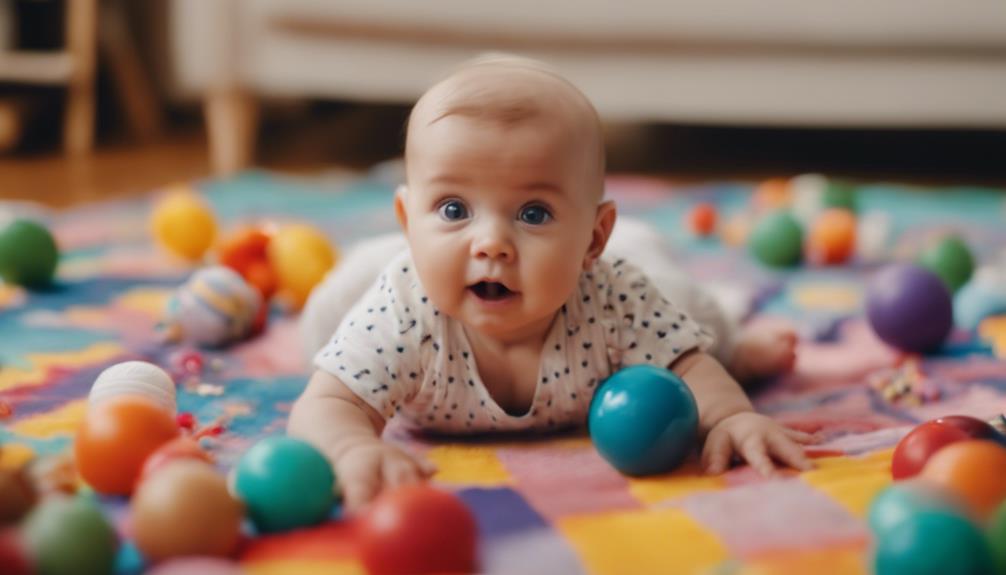
To promote your baby's motor development, focus on milestones such as tummy time to strengthen their neck and upper body muscles.
Encourage reaching, grasping, and rolling activities that enhance their motor skills.
Engage your baby in play-based activities that support crawling, standing, and other movements, fostering a safe and interactive environment for their physical growth.
Motor Skills Milestones
Developing your baby's motor skills is essential during their early months as they progress through various milestones. Understanding the progression of motor skills can help you support your baby's physical development effectively:
- 3-6 Months: During this period, babies start reaching for toys and rolling on their backs during tummy time. These activities help strengthen muscles, improve heart rate regulation, and enhance coordination.
- 6-9 Months: By this stage, babies may achieve milestones like rolling from tummy to back, sitting with assistance, and pushing up on hands and knees. These actions contribute to their sitting position stability and motor skills advancement.
- 9-12 Months: Around this time, babies often begin crawling, rolling, pulling to stand, and playing with toys using both hands. These activities promote further exploration of movement possibilities and fine motor skills development.
Tracking your baby's progress and providing opportunities for them to practice these movements can significantly aid in their physical and motor skills growth.
Play-Based Activities
To support your baby's motor development, incorporate play-based activities that encourage movement and exploration. Interactive play sessions are a vital way to promote baby exercise and enhance their motor skills.
Engage your baby in activities that encourage reaching, grasping, and rolling, helping them develop coordination and strength. Utilizing tummy time is essential for strengthening neck and upper body muscles, preparing your baby for crawling, sitting, and standing.
These play-based movements not only aid in physical development but also foster a strong bond between you and your little one through fun and engaging interactions. By incorporating play into your daily routine, you create a stimulating environment that supports your baby's overall growth and development.
Incorporating Baby Into Your Workout
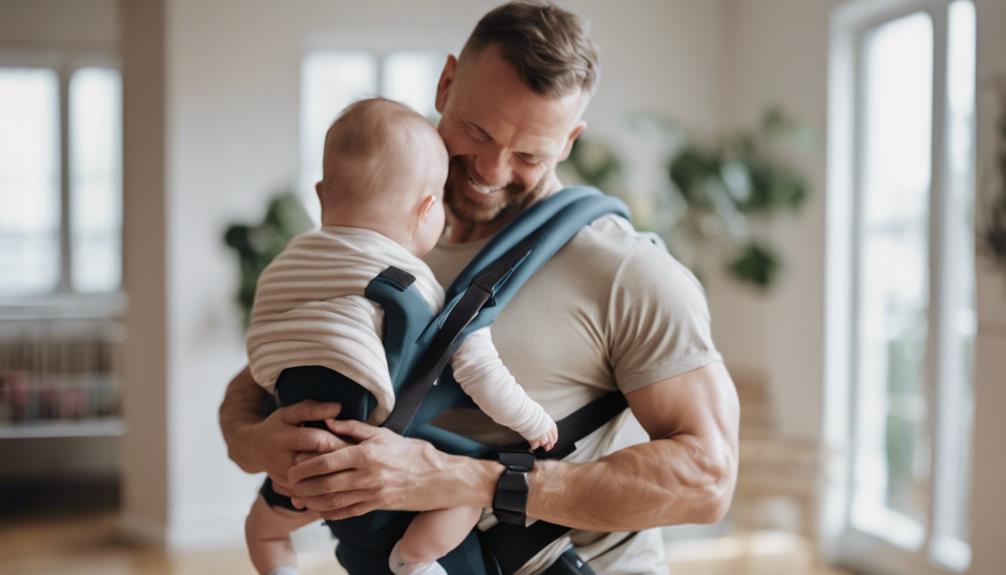
Incorporate your baby into your workout routine to enhance bonding and promote physical development. Giving your baby a good idea of plenty of options to join in won't only benefit you but also foster a healthy and active lifestyle for your little one.
Here are some ways you can include your baby in your workout:
- Stroller Exercises: Take your baby for a walk or jog in the stroller and incorporate exercises like lunges and squats while pushing the stroller for added resistance and interaction.
- Baby-Inclusive Strength Training: Modify exercises like push-ups and overhead press by including your baby. This way, you can work on your strength while engaging your baby in a fun and active manner.
- Dance Together: Dancing is a joyful way to stay active. Put on some music and sway with your baby, promoting movement and bonding through rhythm and movement.
Frequently Asked Questions
How Do I Keep My Baby Active?
To keep your baby active, engage in interactive play, try tummy time, and incorporate age-appropriate exercises like crawling races and dance parties. Use baby-friendly equipment for outdoor activities and always practice safe and supervised exercises for bonding and development.
Does Exercise Make Baby More Active?
Exercise does make babies more active! It's a proven way to boost their energy levels, enhance motor skills, and promote healthy development. So, keep engaging in physical activities with your baby to foster their growth and well-being.
How Do I Keep My Baby Busy While Working Out?
To keep your baby busy while working out, engage them with interactive toys, use carriers for closeness, talk or sing to entertain, add movement into exercises, and opt for face-to-face activities for bonding. Stay active together!
How Do You Stay Active With a Baby?
To stay active with a baby, you can include them in your workouts by dancing, doing stroller lunges, and squats. Make exercise a fun bonding time by incorporating activities like push-ups, press-ups, and baby airplane abs.
Conclusion
Keep your baby active and engaged through fun workout ideas and strengthening exercises.
By incorporating baby exercise into your daily routine, you aren't only promoting your baby's motor development but also strengthening the bond between you and your little one.
Remember, movement is key for your baby's growth and development, so get moving and have fun together!
-

 Activities and Learning4 months ago
Activities and Learning4 months agoEngage Quiet Students With Interactive Quiz Apps
-

 Vetted4 months ago
Vetted4 months ago9 Best Personalized Father's Day Gifts for Your Husband – Thoughtful and Unique Ideas
-

 Activities and Learning4 months ago
Activities and Learning4 months agoAvelox: A Prescription-Free Risk
-

 Activities and Learning4 months ago
Activities and Learning4 months agoActive Forum Requires User Interaction for Access
-

 Activities and Learning4 months ago
Activities and Learning4 months agoRobaxin: CVS Orders, Renal Health Caution
-

 General Tips4 months ago
General Tips4 months agoStruggling Mom Quotes: Words of Hope and Encouragement!
-

 Activities and Learning4 months ago
Activities and Learning4 months agoGet Levaquin: Treat Infections & Stay Safe
-

 Activities and Learning4 months ago
Activities and Learning4 months agoCabaser: Risks, Alternatives, and Gambling Concerns
